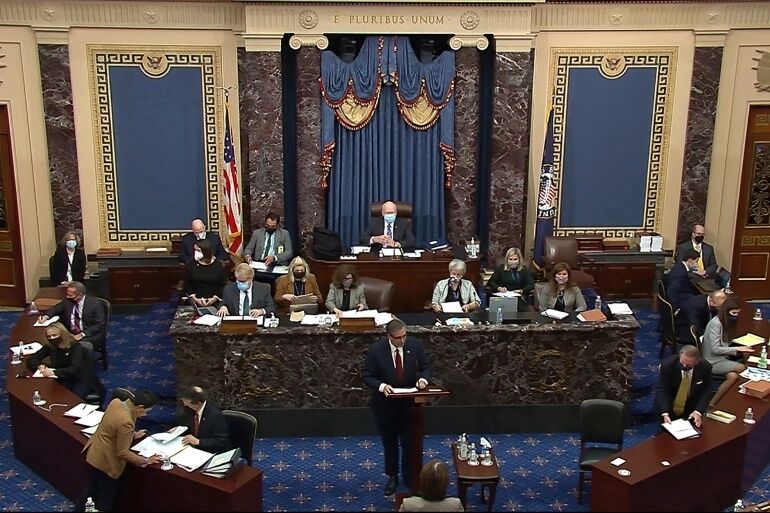Former President Donald Trump is Acquitted in Historic Second Impeachment Trial
Trump’s lawyer speaks in front of the Senate during his second impeachment trial.
February 17, 2021
Donald Trump’s historic second impeachment trial ended Feb. 13 with a 57-43 vote to acquit the former president on charges of incitement of insurrection. Seven Republican senators joined all 50 Democrats in voting to convict Trump, making it the most bipartisan vote to convict in history. In order for Trump to have been convicted, 67 senators would have voted for that verdict.
Trump was charged with high crimes and misdemeanors following the riot at the United States Capitol on Jan. 6, during which a pro-Trump mob stormed the Capitol building while a joint session of Congress was being held inside. With the crucial support of five Republican senators, the Senate voted to move forward with the impeachment trial, which began on Feb. 9.
According to the articles of impeachment passed by the House of Representatives, Trump “willfully made statements that, in context, encouraged—and foreseeably resulted in—lawless action at the Capitol.” House Democrats prosecuting Trump argued that he poses a threat to the United States and could incite further violence if given the opportunity to hold public office again in the future.
The prosecution aimed to appeal to the Senate’s sense of reason and decency, recounting the harrowing experiences of White House aides during the insurrection and showing alarming video footage of the event. In the 14-minute video played during the trial, rioters inside the Capitol could be heard proclaiming their allegiance to the former president.
“We are listening to Trump,” rioters said. “We were invited here.”
House prosecutors also preemptively rebutted an expected argument from Trump’s defense: that Trump’s words to his supporters the day of the riot are protected by the free speech clause of the First Amendment. The prosecution argued that the First Amendment does not give the president a pass to violate his oath of office, which obligates him to protect and defend the Constitution.
“The First Amendment does not create some superpower immunity from impeachment for a president who attacks the Constitution in word and deed while rejecting the outcome of an election he happened to lose,” said Representative Jamie Raskin, a Maryland Democrat and the lead impeachment manager.
Trump’s lawyers laid out their defense, basing their argument on comparing Trump’s behavior to that of Democrats, disparaging the legitimacy of the trial and predictably invoking the First Amendment.
The defense claimed that since Democratic politicians faced little blame for the instances of violence at protests following the police killing of George Floyd, Trump should not be held responsible for the actions of his supporters during the Capitol insurrection. The former president’s lawyers went on to claim that the Senate lacks the authority to convict a president who has left office, despite the Senate vote on Jan. 26 that determined otherwise. As expected, following the prosecution’s preemptive rebuttal, the defense argued that the president is protected by free speech rights and that his address to the crowd did not meet the legal definition of incitement.
“At no point did you hear anything that could ever possibly be construed as Mr. Trump encouraging or sanctioning an insurrection,” said Michael T. Van der Veen, a member of Trump’s legal defense team.
In a statement issued shortly after his acquittal, Trump thanked his lawyers and supporters and called the trial “yet another phase of the greatest witch hunt in the history of our Country.”
“No president has ever gone through anything like it,” Trump said.
Despite producing a historically bipartisan conviction effort, the prosecution’s detailed and meticulous case against Trump was unsuccessful in convincing enough Republican Senators to cross party lines and vote to convict. Trump’s acquittal means he will be legally allowed to run for president again, as many have predicted he will do in 2024.


